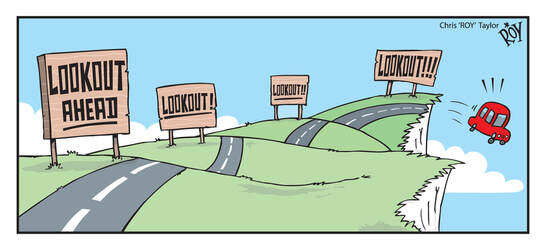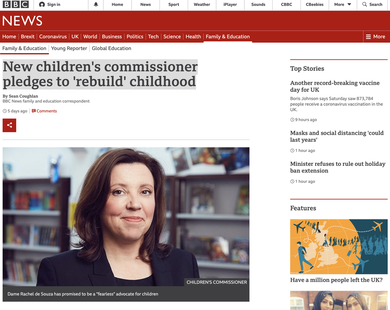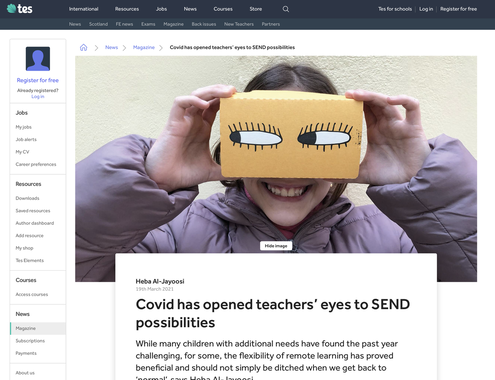|
Douglas Silas,
Specialist SEN Solicitor 22nd March 2021
You can see a lot when you just watch!
Seems really obvious doesn't it, but you will be surprised at how often we fail to notice what it right ahead of us and sometimes staring us in the face. And sometimes the reason we don't see things coming that we should do, is that we are usually too wrapped up in thinking our own thoughts, or spending our time telling other people what we think (whether or not they have asked us!) Another very common reason why we don't see things sometimes, is that we fail to spot patterns repeated by other people, or in repetitive situations. If we don't want to believe something, we often, subliminally, try to convince ourselves that what we are seeing is not really happening (or is not happening again). We don't see the patterns of behaviour at play. It is like we are sometimes in denial and do not want to unconsciously face up to the truth or reality. Yet, in the end we always try to comfort ourselves, by telling ourselves that, deep down, we always knew it and we should have trusted our gut instincts, or have people around us telling us (albeit with the best of intentions) that: "I told you so", which then just makes us feel even worse, or even more defensive. Again, it seems obvious, but we can often notice things if we just look at them more closely and think about them. Like someone once said (and apologies if you have heard another version of this before) - if it looks like a duck and it acts like a duck, it probably is a duck! In this week's SEN Update you will find information about:
I know how busy everyone always is, so please feel free just to read the sections that are of interest to you or read everything; the choice is always yours.
Don’t forget, to ensure that you never miss one, you can get my SEN Updates personally by completing your email details above,
or by following me on one of the social media platforms I use (i.e. Twitter/Facebook). You can also share this SEN Update with others (please only do so if it may be relevant to them) by using one of the icons, usually to the right or at the bottom of this page.
NEW CHILDREN'S COMMISSIONER
After I said in my SEN Update at the beginning of last week that there was not a lot of news to report the week before, the past week has now made up for it with lots of news and articles! So today, although, as usual, I am going to still share a few new stories which I found of interest, in the third section of this update, I want to use the first two sections to look at some of those stories in more detail. The first bit of news I want to share with you is the appointment last week of Dame Rachel de Souza, as the new Children's Commissioner for England (I shared some departing words from her predecessor, Anne Longfield, a few weeks ago). Although widely covered in the media, I can do no better than to quote from the BBC's website article entitled: 'New children's commissioner pledges to 'rebuild' childhood', which said: 'The new children's commissioner for England wants to "rebuild childhood" after the disruption of the pandemic. Dame Rachel de Souza says the scale of the challenge is like reconstructing the social security system in the wake of World War Two. She also wants short-term measures - such as free school meals - being extended into the summer holidays, and not "dropping" Universal Credit levels. Dame Rachel says she will be "fearless" in representing children's interests. The new children's commissioner is launching what is claimed to be England's biggest survey of children - the "Big Ask" - which will gather children's views on the impact of the pandemic, and what they think are the barriers to children's ambitions 'Once in a generation' The online survey, to be sent to all schools and also children in youth custody, children's homes and mental health units, will provide information for a "once-in-a-generation" review of how children's lives might be improved. It takes its "spirit and the ambition" from William Beveridge's 1942 report, which laid the foundations for the post-war welfare state, identifying the five great challenges as "want, disease, ignorance, squalor and idleness". "Our response to the trauma of the Second World War was to create a blueprint for a social service system and a National Health Service that improved our lives. We have the chance to do the same again now for children," says the children's commissioner. Dame Rachel, who ran schools in Norfolk and Suffolk, wants a 10-year plan to emerge from her review - with the promise of tackling a political system which can "often short-change children". For more immediate challenges, on whether free school meals should run across the summer holidays, she told the BBC: "I absolutely want to see free school meals extended. "And I'm very concerned about suggestions of dropping Universal Credit. If it was dropped down again, I'd like to see services provided in its place, but I'd rather it wasn't dropped." A former teacher, head teacher and chief executive of a school academy trust, Dame Rachel promised to be an "independent voice, there to fight to protect and promote the rights of children". If government was "doing something wrong", she said, "I will be fearless in exposing that and challenging them". 840 million missed days in school The review will consider how children will recover from so much disrupted education - calculating that collectively pupils in England have lost 840 million days of in-person schooling since the start of the pandemic, representing about 19 weeks each. It will address the "social fault lines" and inequalities that have been exacerbated by the pandemic, between generations, the wealthy and the disadvantaged, by ethnicity and geography. This includes how the gulf between rich and poor and young and old has widened, with older, higher earners increasing their savings in the lockdown, while poorer families and younger people have faced job losses and increasingly fragile finances. Today's young people are the first post-war generation to be less well-off than their parents, says the report launching the children's commissioner's review. Catch-up funding "As we emerge from the Covid pandemic, this is the moment for something big, for children to recognise the sacrifices they have made," said Dame Rachel. "I have seen first-hand the effect of this crisis on young people's hopes and dreams, and sometimes our answers simply have not been good enough." Labour's Shadow Education Secretary Kate Green said: "Over the last decade the Conservatives have overseen record numbers of children being pushed into poverty, a worsening mental health crisis and an 18-month gap in learning between disadvantaged children and their peers at GCSE." A Department for Education spokeswoman said: "We know that children and families have faced unprecedented challenges during the pandemic. "We've expanded frontline charity support and provided new resources for schools and teachers to support children and young people's mental health. "Our £1.7bn investment in recovery support will help tackle the impact of any lost learning and we are investing an additional £79m to increase the number of mental health support teams working with schools and colleges."' There was also a video, which you may find of interest to watch...
A NEW WAY FOR SEN?
The second bit of news that I want to share with you is an article written for TES by Heba Al-Jayoosie, who is assistant head (Inclusion) at Mayflower Primary School in London, entitled: 'Covid has opened teachers’ eyes to SEND possibilities'. I would usually just suggest you click the link to read it if you want to, but since it is so insightful, I thought I would quote from it here fully, as follows: 'The pandemic has been hard for everyone but, for many pupils with special educational needs and disability (SEND), and their families, the past year has been particularly challenging. Many of these families already felt marginalised and the sudden shift to remote learning exacerbated difficulties for some.But there were also pupils with SEND who adapted really well to the change, with schools demonstrating creativity and flexibility in meeting their unique needs. So, what has the past year taught us about effective SEND education? And how could this help us to change provision for good? Working collaboratively with families has always been crucial and the pandemic has highlighted just how important school-home collaboration is. In trying to plan any kind of provision for pupils with SEND during lockdown, schools needed to know each individual’s strengths and challenges, as well as the context of their family. SEND support This meant answering countless questions: is school or home more conducive to learning? What about the wellbeing of the child? What can the child do independently? How can we use the parent/carer strengths? What resources are needed? These are questions that continue to matter at all times, not just in the midst of a pandemic. And the solutions that schools devised during lockdown show how we can use such questions to tailor our support. Some children had home programmes that their families were able to help deliver and many schools were able to lend resources, including gym equipment. Interventions such as reading recovery, speech and language or occupational therapy are an essential part of provision for many, and teletherapy offered a successful way of delivering some of these remotely. Those who may have struggled with sensory overload in a regular class enjoyed learning from the comfort of home. The ability to take part in class discussions using the chat function helped many to make extended contributions (much more so than they may have made in class). Many teachers also planned specific online times for social connection, and the clear rules and codes of conduct were reassuring for some SEND students, particularly in comparison with a busy playground. Asynchronous online teaching also brought benefits, enabling students to repeat lessons as needed, as well as working to flexible deadlines, giving them more control of their day. While it might not be easy to replicate all of these benefits in the future, it certainly shows what can be achieved if we take a more flexible approach. Perhaps, for instance, a blended model combining in- and out-of- school learning will really become a feasible option for some pupils. The pandemic has forced us to rethink how we do things for pupils with SEND – and has given us fresh insight into what matters most for these pupils and their families. We’ve seen benefits and disadvantages, but there can be no denying that it has opened our eyes to what is possible. I hope that the biggest takeaway from this past year is that we can be more flexible than we used to be. As much as we all want things to return to normal, I’m hopeful that “normal” can become something better than it was before.'
LATEST NEWS ONLINE
In terms of other news articles, here are the others I found of interest: - School attendance back at high levels in England - Schools Covid catch-up programme 'not reaching disadvantaged pupils' - Teachers face 'epidemic of demotivated children' - Families facing special education needs 'postcode lottery' - Pupils in England less likely to get special needs support in poorer areas
Where can I find further information?
Again, aside from clicking on the relevant links for more information, I would also remind you of the very useful resources and information provided on the following websites: - IPSEA - Council for Disabled Children - Contact - Scope - Special Needs Jungle I would also highlight again the fact that you can now get a digital copy of the magazine: Autism Eye which is very helpful to any parents or professionals involved with children/young people with Autism. Keep safe until next week. With best wishes Douglas
P.S I understand that there are many educational items, news articles, or other useful resources on the web, so I would be very grateful if you could let me know of any that you find that you think that others may find useful, so that I can direct people to them.
How useful do you find my SEN Updates?
Created with Quiz Maker
Comments are closed.
|
Archive
March 2022
|
© Douglas Silas Solicitors 2005-24
Authorised and Regulated by the Solicitors Regulation Authority (SRA no: 643718)
‘Douglas Silas Solicitors’ is the trading name of ‘Douglas Silas Solicitors Limited’, a limited company registered in England & Wales (company no: 10689991), whose registered office is Gable House, 239 Regents Park Road, Finchley, London, United Kingdom, N3 3LF. A list of members/directors may be inspected at our office.
Authorised and Regulated by the Solicitors Regulation Authority (SRA no: 643718)
‘Douglas Silas Solicitors’ is the trading name of ‘Douglas Silas Solicitors Limited’, a limited company registered in England & Wales (company no: 10689991), whose registered office is Gable House, 239 Regents Park Road, Finchley, London, United Kingdom, N3 3LF. A list of members/directors may be inspected at our office.






 RSS Feed
RSS Feed







